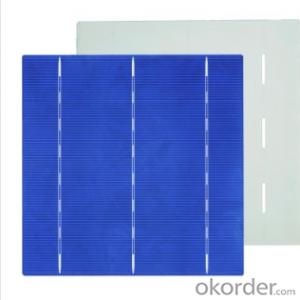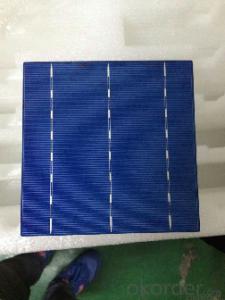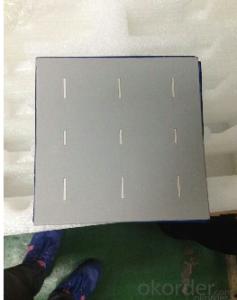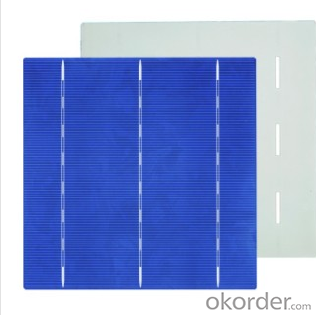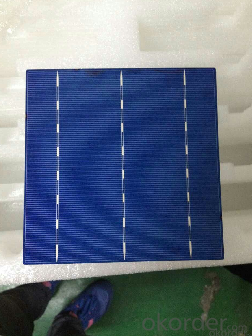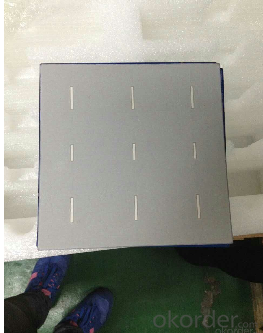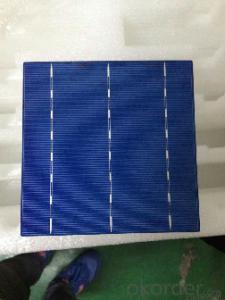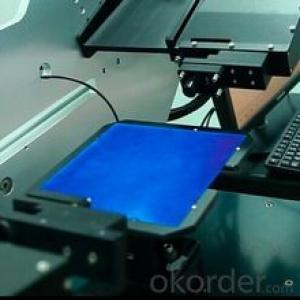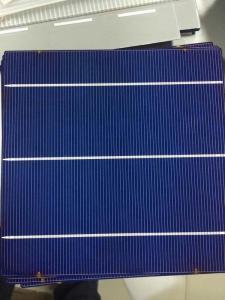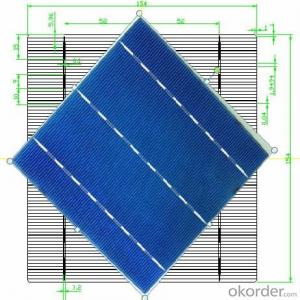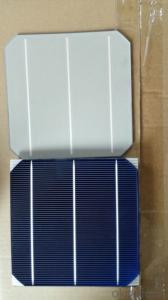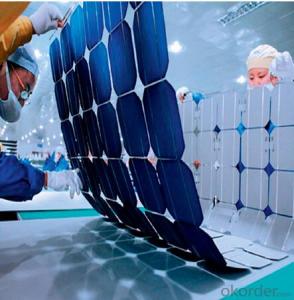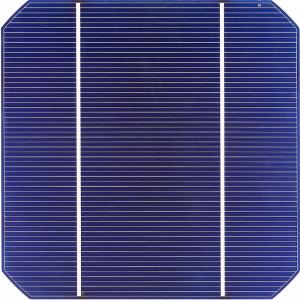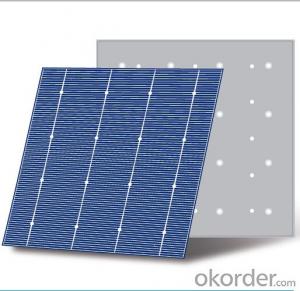Emcore Solar Cells Poly Solar Cells 156mmx156mm from CNBM
- Loading Port:
- China main port
- Payment Terms:
- TT OR LC
- Min Order Qty:
- 500 pc
- Supply Capability:
- 10000000 pc/month
OKorder Service Pledge
OKorder Financial Service
You Might Also Like
1.Product Description:
Production and Quality Control
CSG fully integrated PV chain from silicon materials, ingot, wafer, solar cell to solar module, and well-established QC management system, to guarantee consistency of high quality;
Mature technical control and strict sorting standard, to ensure consistency and reliability of solar cell;
Completely careful operation during production to avoid micro-cracks and reduce breakage rates during module assembly;
Electrical Properties
Mature crystalline cells manufacturing technology and complete quality control system, to ensure excellent electrical stability;
Lower module encapsulation loss realized by reasonable electrical characteristics setting, including high voltage and low current, high parallel resistance and low series resistance, classification with precise current classes, and positive power tolerance;
Excellent conversion efficiency, weak light performance and shortwave response guaranteed by leading R&D innovation system;
Recommend Welding Technique
Welding:tin-coated copper ribbons, coated with 20-25μm thickness (64%Sn,36%Pb)
2.Main feature:
Better shortwave response ensured by Selective Emitter Technology;
Better continuousness of fingers and stable performance ensured by Double Printing Technology;
Whole-process inspection from wafer input to cell packaging, to ensure high quality and excellent performance;
3.images:
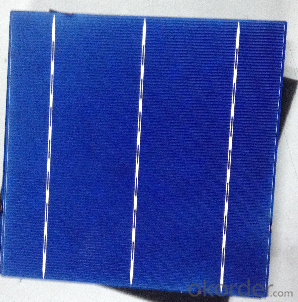
4.specifications:
Format 156 mm × 156 mm ± 0.5 mm
Thickness- 210μm ± 40 μm
Front (-) 1.5mm bus bars (silver),blue anti-reflection coating (silicon nitride)
Back (+) 2.5mm wide soldering pads (silver) back surface field (aluminium
5.FAQ:
What is the advantages of your products?
1. High efficiency and High power.
2. Long-term electrical stability.
3. Lowest price and Fastest delivery.
4. Good quality and good service.
5. Bulk supply
6. Good Warranty
7. Big Sale
8. More than 25 years on the lifetime.
- Q: What is the impact of shadows on solar cell performance?
- Shadows have a negative impact on solar cell performance as they decrease the amount of sunlight reaching the solar panel, therefore reducing the electricity generation. Shadows can create "hot spots" on the cells, leading to higher temperatures and potential damage. It is essential to ensure that solar panels are installed in areas free from shadows to maximize their efficiency and overall performance.
- Q: Can solar cells be used on airplanes?
- Yes, solar cells can be used on airplanes. In recent years, there has been a rise in the use of solar cells to power various aircraft systems, such as auxiliary power units and cabin lighting. Additionally, there have been successful attempts to develop solar-powered unmanned aerial vehicles (UAVs) that can fly for extended periods using solar energy. However, due to the limited surface area available on airplanes and the current efficiency of solar cells, it is not yet feasible to solely rely on solar power for the propulsion of large commercial aircraft.
- Q: Does the solar cell generate electricity in the absence of the sun, only in the case of strong lights or lasers? If you can achieve how much, and the same day?
- One of the directions for the development of modern solar cells is to maximize the frequency range of the light waves that can be energized (to the low frequency direction) to increase the power generation efficiency of solar cells.
- Q: What is the effect of shading on solar cell performance?
- The effect of shading on solar cell performance is significant as shading can reduce the overall power output of the solar panels. When even a small portion of the solar cell is shaded, it creates a "hot spot" effect, leading to increased resistance and reduced electrical current. This can result in a notable decrease in energy production, impacting the overall efficiency and performance of the solar cell system.
- Q: Can solar cells be installed on any type of roof?
- Solar cells can be installed on most types of roofs, including flat, sloped, and even curved roofs. However, the feasibility and efficiency of installation may vary depending on factors such as roof orientation, shading, structural integrity, and local regulations. It is advisable to consult with a professional solar installer to determine the suitability of your specific roof for solar panel installation.
- Q: What are the disadvantages of using solar cells?
- One disadvantage of using solar cells is their high initial cost. The installation and setup of solar panels can be expensive, making it less accessible for some individuals or households. Additionally, solar cells are dependent on sunlight, so their efficiency can be affected by weather conditions, such as cloudy days or limited sunlight during winter months. Moreover, the production of solar cells involves the use of certain materials that can have environmental impacts, such as the extraction of rare minerals. However, advancements in technology and decreasing costs are gradually reducing these disadvantages and making solar energy a more viable option for sustainable energy production.
- Q: How do solar cells contribute to reducing carbon emissions?
- Solar cells contribute to reducing carbon emissions by converting sunlight into electricity without burning fossil fuels. As a clean and renewable energy source, solar cells help decrease the reliance on coal, oil, and gas power plants that emit greenhouse gases. By harnessing the sun's energy, they generate electricity with zero carbon emissions, thereby mitigating climate change and promoting a more sustainable future.
- Q: How are solar cells integrated into building designs?
- Solar cells can be integrated into building designs in a variety of ways. They can be incorporated into the roof or facade of a building, where they function as both a renewable energy source and a structural element. Additionally, solar cells can be installed as shading devices, such as solar awnings or sunshades. This integration allows buildings to generate electricity from the sun while maintaining an aesthetically pleasing design.
- Q: Can solar cells be used for desalination purposes?
- Yes, solar cells can be used for desalination purposes. Solar-powered desalination systems, such as reverse osmosis (RO) or solar stills, can convert saltwater into freshwater by utilizing the energy from sunlight to power the desalination process. This renewable energy source makes desalination more sustainable and environmentally friendly.
- Q: What is the impact of dust or dirt on solar cell performance?
- The presence of dust or dirt on solar cells can significantly impact their performance. When dust or dirt accumulates on the surface of the solar cells, it forms a barrier that reduces the amount of sunlight reaching the cells. This reduces the efficiency of the solar cells and subsequently decreases the amount of electricity they can generate. Additionally, dust or dirt can create shadows on the cells, resulting in localized hot spots that can damage the cells over time. Therefore, regular cleaning and maintenance of solar panels is crucial to ensure optimal performance and maximize energy production.
Send your message to us
Emcore Solar Cells Poly Solar Cells 156mmx156mm from CNBM
- Loading Port:
- China main port
- Payment Terms:
- TT OR LC
- Min Order Qty:
- 500 pc
- Supply Capability:
- 10000000 pc/month
OKorder Service Pledge
OKorder Financial Service
Similar products
Hot products
Hot Searches
Related keywords
